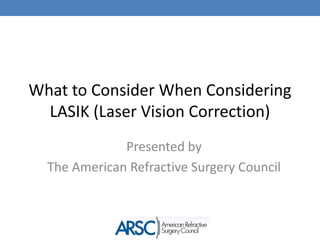What To Consider When Considering LASIK
- 1. What to Consider When Considering LASIK (Laser Vision Correction)Presented by The American Refractive Surgery Council
- 2. About LASIK For more than a decade, LASIK ŌĆō one of the most studied medical procedures -- has been considered a safe and effective vision correction option for those who are nearsighted, farsighted and/or have astigmatism.Like all medical procedures, LASIK has benefits and risks and the decision to have LASIK should include questions and research.
- 3. Things to Do When Considering LASIKExperts at the American Refractive Surgery Council (ARSC) recommend you follow these steps:First, ask yourself some questions about your vision lifestyleSecond, learn about what LASIK is (and what it is not)Third, make an appointment with an experienced ophthalmologist
- 4. Ask Yourself Some QuestionsDo glasses and/or contacts interfere with my daily life? Am I active? Into sports or outdoor activities?Can a vision care procedure, such as LASIK, enhance my lifestyle?
- 5. Learn What LASIK Is and Is NotLASIK, one of many surgical vision correction options available, is an out-patient procedure that uses laser technology to reshape the cornea. ŌĆ£LASIK is a great choice for those with active lifestyles where glasses and contacts interfere with their daily life, a stable vision prescription and realistic expectations about what the procedure can do,ŌĆØ said Eric D. Donnenfeld, M.D., F.A.C.S. and member of the American Refractive Surgery Council. LASIK doesnŌĆÖt always completely eliminate the need for glasses ŌĆō for example, those with age-related vision issues such as presbyopia may eventually need reading glasses, as almost everyone will at some point.
- 6. Make an Appointment with an Experienced OphthalmologistLook for an Ophthalmologist who is certified with the American Board of Ophthalmology and has performed at least 200 procedures.Get referrals from friends, family or a trusted physician. Experienced surgeons often have additional certifications, may be on staff at a university medical school and participate in clinical research.
- 7. Decide if LASIK is Right for YouFinally, in partnership with your surgeon, determine if you are a good candidate for LASIK. Many ophthalmologists offer pre-operative exams for free. Expect the exam to take two to three hours during which time you will have your vision, eyes and overall health evaluated.Share your full health history with your doctor. There are medical conditions, such as diabetes, that may make LASIK and other laser vision correction options a poor choice. Also, certain medications, such as corticosteroids, can affect the healing process. ŌĆ£Education and counseling are among the most important things we do as surgeons. You want a doctor whoŌĆÖs accessible and willing to not only tell you all the good things about LASIK but also if youŌĆÖre not a good candidate,ŌĆØ said Dr. Donnenfeld.
- 8. For More Information Please Visit: www.AmericanRefractiveSurgeryCouncil.org








